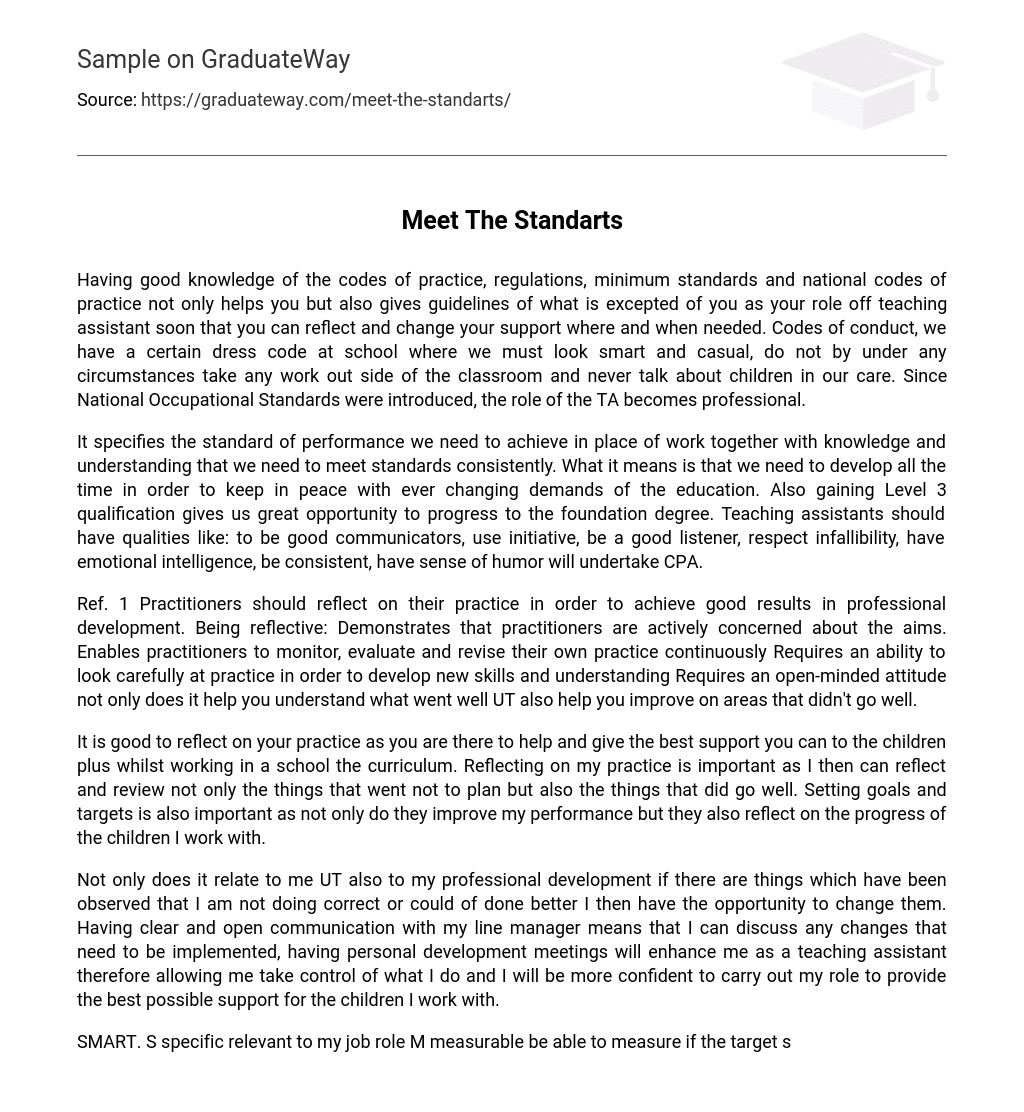Having a good understanding of codes of practice, regulations, minimum standards, and national codes of practice is beneficial for teaching assistants. These guidelines outline expectations and help inform the TA’s role. Being aware of these standards allows TAs to adapt and modify their support as necessary. Codes of conduct are also important, as they establish certain requirements such as a dress code and prohibit discussing students outside of the classroom. The introduction of National Occupational Standards has elevated the role of TAs to a professional level.
The text highlights the significance of meeting performance standards and having the required knowledge and understanding to consistently meet them in the workplace. It stresses the importance of continuous development to adapt to evolving educational demands. Moreover, obtaining a Level 3 qualification offers a valuable opportunity for advancement towards a foundation degree. Teaching assistants should possess key qualities such as effective communication, initiative, active listening, respect for diversity, emotional intelligence, consistency, and a sense of humor. These qualities are crucial for undertaking CPA.
Ref. 1 Practitioners should engage in reflection as part of their professional development to achieve positive outcomes. Reflecting: Shows that practitioners are actively invested in their goals. Allows practitioners to consistently assess, evaluate, and modify their own practice. Involves carefully examining practice to cultivate new skills and knowledge. Requires an open-minded approach that not only helps identify successful aspects, but also aids in improving areas that need enhancement.
Reflecting on your practice is essential in providing the best support and help to the children and following the school curriculum. It allows for an evaluation of both successful and unsuccessful outcomes. Setting goals and targets improves performance and monitors the progress of the children.
Not only does it relate to me UT also to my professional development if there are things which have been observed that I am not doing correct or could of done better I then have the opportunity to change them. Having clear and open communication with my line manager means that I can discuss any changes that need to be implemented, having personal development meetings will enhance me as a teaching assistant therefore allowing me take control of what I do and I will be more confident to carry out my role to provide the best possible support for the children I work with.
SMART. S specific: relevant to my job role. M measurable: be able to measure if the target set is a realistic target. A achievable: the target should not be too difficult or inaccessible. R realistic: you should make sure that you have access to the training or resources required. T time: that you should reach your target, priority. Can reflect on my practice most of the time, do it automatically, knowing that I shouldn’t just concentrate on what I thought went well, but also think about how I can improve on the areas that didn’t go as well.
In March 2015, my team leader conducted a personal review with me which prompted me to change my work approach. To my surprise, I have already achieved two goals that I initially thought were unattainable. As a result, I now make it a point to plan and document all my work at school.23. It is crucial to acknowledge that our own values, beliefs, and experiences can impact how we work as teaching assistants. Not all teachers, teaching assistants, or parents may hold the same values or beliefs. However, as professionals, it is our duty to support the children and respect their individual beliefs.
It is crucial to prioritize understanding others’ viewpoints and avoiding discrimination in our interactions. Maintaining professionalism is essential as our goal is to assist children, regardless of differing personal beliefs. By assessing the impact of learning activities on our approach, we enhance awareness of achievements and identify areas requiring further improvement in effectively reaching and supporting children.
I engage in self-evaluation and adjust my practice accordingly. Recently, I conducted an activity involving children with different abilities, but it did not go as expected. Realizing that the activity was not suitable for all the children, I reflected on what went wrong. I observed that some of the children with lower abilities struggled with reading. Therefore, for the next session, I reorganized the groups and saw improved results. The children felt more comfortable and confident in their own capabilities.
Through self-reflection, I have recognized my mistakes and made the necessary changes. This benefits both myself and the children I assist. To monitor their progress, I document it using feedback sheets and reading grids. These records are then returned to the teacher. Moreover, I seek guidance from my line leader to ensure optimal performance in my duties.
To ensure the provision of optimal care for children, teaching assistants rely on implementing codes of practice regulations, minimum standards, and national occupational standards. It is crucial that we engage in self-reflection to identify areas of improvement within our own personal practice. This enables us to receive appropriate training and adjust our teaching methods accordingly, thus enhancing our ability to educate children effectively.
Furthermore, dedicating time to introspect on your work will enhance both your confidence and effectiveness in your role. It is essential to acknowledge our professional responsibility in comprehending how we impact children’s learning. Moreover, self-reflection is imperative as it not only exposes errors but also highlights positive accomplishments.





